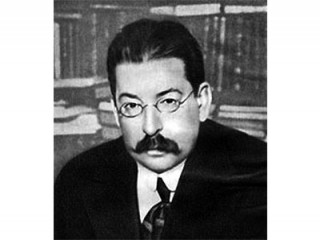
Jose Enrique Rodo biography
Date of birth : 1872-07-15
Date of death : 1917-05-01
Birthplace : Montevideo, Uruguay
Nationality : Uruguayan
Category : Famous Figures
Last modified : 2011-08-10
Credited as : Essayist, modernismo,
José Enrique Rodó was a Uruguayan essayist and literary critic. A stylist and moralist, he aimed especially to maintain Latin American thought and society on a basis of respect for traditional European humanistic and ethical values.
José Enrique Rodó was born in Montevideo on July 15, 1872. The son of a Catalan father who died when José was twelve, he was largely self-taught. He attended primary school but left secondary school for part-time employment. He read broadly in the library left by his father and in the library of the Ateneo of Montevideo. An intellectual center in the arts and humanities, the Ateneo also provided the atmosphere that nourished Rodó's growth. He was greatly influenced by the works of French, Spanish, and British essayists and paid much attention to works on the United States.
Rodó's youth was a period of great, and occasionally violent, change in Uruguay. In March 1895, together with several other young men, Rodó founded the Revista nacional de literatura y ciencias sociales. Sixty issues appeared before its closing. Rodó had wanted to found an academy of literature and language, and this had been a compromise. Rodó's concerns for traditional values and proper use of the language were reflected in his publications. His work was unique to the extent that without signature it was recognized even in Spain for his control of ideas and of the modernista literary style.
The spiritual and intellectual unity of Latin America with Spain and Europe was Rodó's principal concern; he regarded even Brazil as a variation of this principle, and his main work, Ariel (1900), discussed his views in much detail. Latin America's peril lay in its enthusiasm for moral and intellectual change and the susceptibility to United States influence this produced.
Rodó admired some aspects of American life: its technology, spirit of personal liberty and open society, respect for useful labor, and rapid growth of political greatness. But these could entrap an uncritical society—and particularly the Latin masses. American materialism was an open challenge to Latin America.
Rodó praised the traditions of humanism and intellectual achievement of southern Europe's past and present. The "hallowed cultural tradition and respect for genius" should combine with the Latin Americans' sense of liberty and material progress but never to the disadvantage of the superior minority which maintains its values alive. A leveling process should never occur through mass education or populist technical change.
In 1897 a revolution overthrew the President, and Rodó closed his journal in the interests of political peace and shortly after accepted a professorship in literature in the National University. Indicative of the open atmosphere was Rodó's recommendation by Samuel Blixen, publisher of an avowed anti-Catholic newspaper, for his own post.
In 1902 Rodó accepted election to the national Chamber of Representatives, where he served for 8 years. He opposed the government's open anti-Church position under José Battle but made no headway. Rodó returned to intellectual work and supported himself by teaching and newspaper work. On July 14, 1916, he left for Europe as foreign correspondent for publications in Montevideo and Buenos Aires. He died in Palermo, Italy, on May 1, 1917.
Rodó's influence on the young intellectuals and idealists of his time, and Latin Americans up to the 1940s, was enormous. Since he never visited the United States, many of his ideas were less than accurate. But he stated strongly the principle of Latin uniqueness in contrast with the United States and set a standard that has retained importance.
Ariel was the third in a pamphlet series entitled La vida nueva. Other titles were El que vendrá (1897) and Rubén DarÃo (1899); the latter is a critical analysis of the work of the famed Nicaraguan poet. In 1906, reflecting his political experience, Rodó wrote Liberalismo y jacobinismo, a pamphlet. In 1909 he published a book, Motivos de Proteo. A posthumous work is El camino de Paros, a collection of pieces written in 1916 and 1917.
















